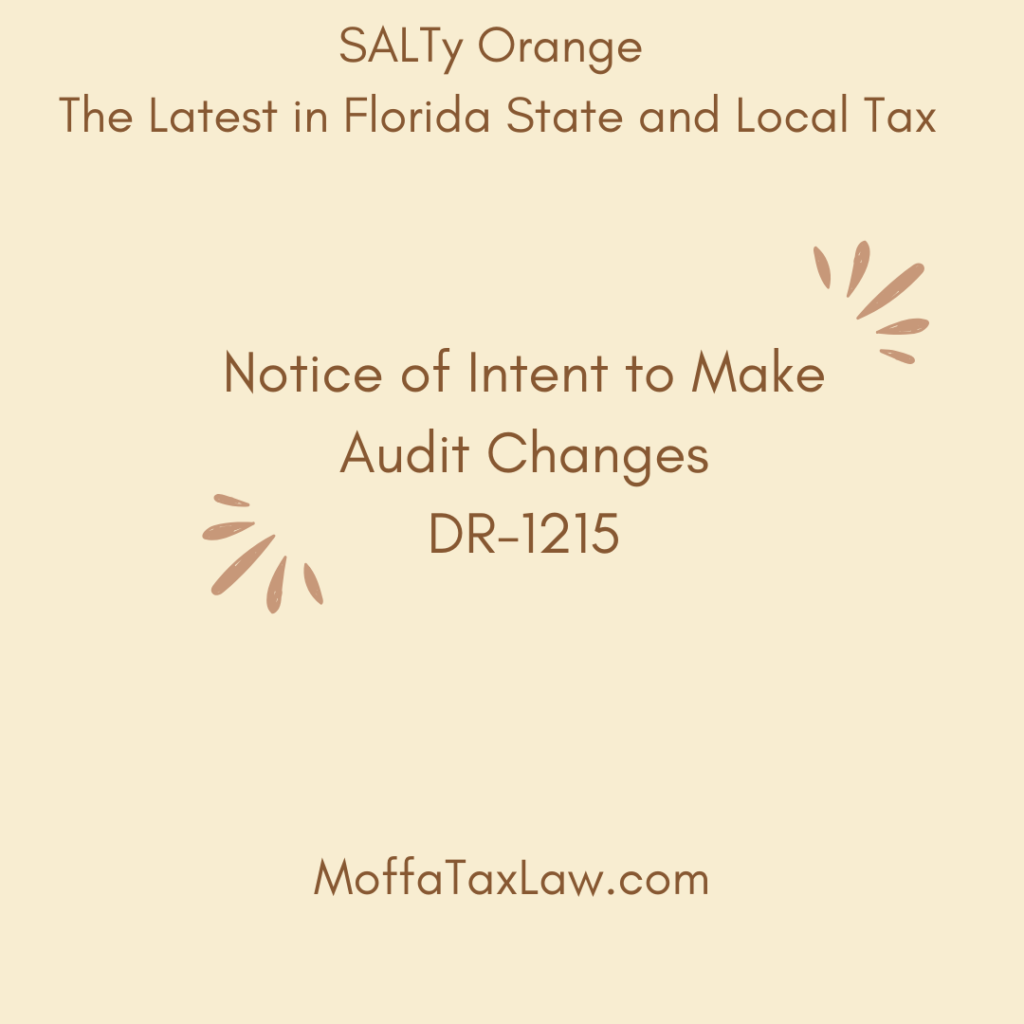NEWS & INSIGHTS


What is a Florida Notice of Intent to Make Audit Changes (Form DR-1215)?
The Florida Notice of Intent to Make Audit Changes (Form DR-1215) is an official document issued by the Florida Department of Revenue (FDOR) during the tax audit process. It indicates that the FDOR has completed a preliminary review of your records and is proposing adjustments to your tax filings based on their findings. This form serves as a formal notification of potential discrepancies and provides the taxpayer an opportunity to respond before the audit findings are finalized.
In this article, we’ll break down the purpose of Form DR-1215, what it means for your business, and how to address it effectively to minimize any negative impact.
Purpose of the DR-1215 Notice
The DR-1215 notice is issued when an auditor identifies issues during an audit that may require changes to your tax filings. Its primary purposes are:
- To Inform: The notice outlines the specific adjustments the FDOR proposes, such as additional tax liabilities, disallowed exemptions, or corrections to reported sales or deductions.
- To Provide a Summary: It summarizes the basis for the proposed changes and explains how the adjustments were calculated.
- To Allow a Response: Taxpayers have an opportunity to review the proposed changes, ask questions, or present additional documentation to dispute or clarify the findings.
When Is the DR-1215 Notice Issued?
The DR-1215 form is typically issued after the auditor has completed their review of your financial records and determined that changes to your tax filings are warranted. It is part of the audit process and is not necessarily the final determination. Instead, it serves as an initial proposal, allowing for further dialogue between the taxpayer and the FDOR before the audit is concluded.
What Does the DR-1215 Notice Include?
The Notice of Intent to Make Audit Changes (Form DR-1215) usually contains the following key elements:
- Taxpayer Information
- Business name and address
- Taxpayer identification number (TIN)
- Audit Period
- The specific time frame under review (e.g., a particular tax year or series of years).
- Proposed Adjustments
- Detailed descriptions of the changes the FDOR intends to make, including:
- Additional taxes owed
- Disallowed deductions or exemptions
- Adjustments to taxable sales or use tax calculations
- Detailed descriptions of the changes the FDOR intends to make, including:
- Reasons for Changes
- Explanations for why the adjustments are being proposed, such as missing documentation, incorrect tax rates, or unreported transactions.
- Instructions for Responding
- How to contact the auditor
- Deadlines for submitting additional documentation or disputing the findings. While the letter requires the auditor to provide 30 days for the taxpayer to request a conference, it is important to know that they do not always wait the full 30 days before issuing a Notice of Proposed Assessment which concludes the audit.
- Potential Penalties and Interest
- Estimates of penalties and interest that may be applied if the adjustments are finalized and taxes remain unpaid.
- Estimates of penalties and interest that may be applied if the adjustments are finalized and taxes remain unpaid.
How Should You Respond to a DR-1215 Notice?
Receiving a DR-1215 notice is serious but manageable if you act promptly and strategically. Here’s what you should do:
- Review the Notice Thoroughly
- Examine the proposed adjustments and ensure you understand the changes and the reasons behind them.
- Gather Supporting Documentation
- If you disagree with any of the proposed changes, collect evidence to support your position, such as:
- Sales invoices and receipts
- Exemption certificates
- Bank statements
- Purchase records
- Contact the Auditor
- The notice will include contact information for the FDOR auditor assigned to your case. Reach out to discuss the proposed changes and seek clarification if needed.
- Provide Additional Information
- Submit any missing or additional documentation that could help resolve discrepancies. Ensure submissions are clear, organized, and directly address the issues raised in the notice.
- Consult a Tax Professional
- Engage a tax attorney, CPA, or audit specialist to review the notice, assist with documentation, and represent you in discussions with the FDOR.
- Meet Deadlines
- Respond to the notice within the timeframe specified. Failure to meet deadlines could result in the proposed adjustments being finalized without your input.
- Request Reconsideration or Appeal
- If you disagree with the auditor’s findings after responding to the DR-1215 notice, you may request further review or file a formal appeal.
What Happens If You Don’t Respond?
Ignoring a DR-1215 notice can have serious consequences. If you fail to respond within the specified timeframe:
- The proposed changes may be finalized, resulting in:
- Additional tax liabilities
- Penalties for underpayment or late payment
- Interest charges on unpaid taxes
- The FDOR may escalate enforcement actions, such as issuing a Notice of Proposed Assessment (NOPA) or pursuing collection efforts.
Common Issues Leading to a DR-1215 Notice
Several factors can lead to the issuance of a DR-1215 notice, including:
- Underreported Sales
Failing to report all taxable sales or applying incorrect tax rates. - Invalid or Missing Exemption Certificates
Not having proper documentation for claimed sales tax exemptions. - Use Tax Discrepancies
Failure to pay use tax on purchases made without sales tax. - Incorrect Deductions
Claiming deductions that don’t meet state requirements or are improperly calculated. - Incomplete Records
Poor recordkeeping or failure to provide requested documentation during the audit.
How to Avoid Future Issues with DR-1215 Notices
While audits and tax adjustments aren’t always preventable, you can take proactive steps to reduce your risk:
- Maintain Accurate Records
Keep thorough, organized, and up-to-date financial records for at least five years. - Understand Tax Laws
Familiarize yourself with Florida’s tax regulations, especially those concerning sales and use tax. - File Accurate Returns
Double-check all tax filings for errors or omissions before submission. - Conduct Internal Audits
Regularly review your financial records and tax filings to identify and correct discrepancies. - Consult Professionals
Work with a tax professional to ensure ongoing compliance and stay informed about changes to state tax laws.
Conclusion
The Florida Notice of Intent to Make Audit Changes (Form DR-1215) is an essential part of the state tax audit process. While it can be daunting to receive, understanding its purpose and responding appropriately can make all the difference. By carefully reviewing the notice, providing additional documentation, and seeking professional guidance, you can effectively address the proposed changes and minimize potential liabilities.
Remember, the DR-1215 notice is not the final word—it’s an opportunity to collaborate with the FDOR to resolve discrepancies and ensure your tax filings are accurate. With prompt action and the right support, you can navigate the process with confidence.
Additional Articles by the SALTy Orange at Moffa Tax Law:
DR-840 Notice of Intent to Audit Books and Records – 2025
What to Expect from a Florida Tax Audit
Temporary Suspension of Hillsborough County Discretionary Sales Surtaxes
Motor Vehicle Sales Tax Rates by State – 2024
Florida Corporate Income Tax Case Lost on Procedural Technicality

Jeanette Moffa, Esq.
Phone: (954) 800-4138
Email: JeanetteMoffa@MoffaTaxLaw.com
Jeanette Moffa is a Partner in the Fort Lauderdale office of Moffa, Sutton, & Donnini. She focuses her practice in Florida state and local tax. Jeanette provides SALT planning and consulting as part of her practice, addressing issues such as nexus and taxability, including exemptions, inclusions, and exclusions of transactions from the tax base. In addition, she handles tax controversy, working with state and local agencies in resolution of assessment and refund cases. She also litigates state and local tax and administrative law issues.


